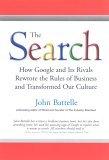
The effect of easy Web searching has been just as dramatic on my kids' homework. Almost every research project begins at Google's Web page and ends at a Wikipedia article or museum Web site. Remember when we had to buy expensive encyclopedias or go to the library?
It is hard to imagine that it has only been seven years since Google started. There were many search engines before it -- I was an enthusiastic user of Archie, Veronica, WAIS and Alta Vista -- but nothing has approached the impact of Google. We've become accustomed to being able to find out almost anything with a mouse click or two.
John Battelle's The Search: How Google and Its Rivals Rewrote the Rules of Business and Transformed Our Culture doesn't focus just on Google, but the company dominates the book as thoroughly as it does the industry. Its origins in a Stanford University dorm room (the same school that spawned Yahoo!), its initial stumbles in the quest for a sustainable business model, its competition with other search companies, and the debt it owes its predecessors, are all well described.
Battelle, however, focuses on the most interesting side effect of searching: it's a gold mine of consumer intentions. By searching for "digital camera" on Google, Yahoo or MSN, we're screaming to the Internet, "I want to buy a camera!" Each search company has used that information in different ways, reflecting their varied origins. Yahoo, unlike Google, was ready and willing earlier to exploit that stream of information for commerce. Google took a more cautious approach, resisting banner ads and paid search placement, for example. But its laser focus on usefulness and staying out of the user's way have paid off.
The book also explores the not-insignificant privacy implications of Google's enormous database of our intentions. Its slogan may be "Don't Be Evil," but that means nothing in the face of the Patriot Act in the U.S., even more draconian laws in China and elsewhere or the mindless, remorseless march of commerce.
One potential failing of the book is that it's in danger of overstating its case. As impressive as search is, I'm not sure it has had the same impact on people outside of journalism, research or the technology industry. Even a tech geek like me found the latest Google Desktop software less than essential. I uninstalled it a few weeks after trying it out because I found I never used it. And there are limits to the usefulness of search, such as when you're not sure what you're looking for. For that, recommendation engines, blogs, tagging systems like Flickr and Del.icio.us and even product suggestions on Amazon are more useful at ferreting out interesting information that I didn't even know I wanted, based on the collective judgment of people with similar tastes.
All of these challenges to Google's dominance are covered, but there isn't much discussion about how the company has been clumsy in its attempts to expand out of search. Blogger has changed hardly at all since Google purchased it, for example. Google Talk and the company's new blog reader are rudimentary at best.
The book is so current (just a few months out of date) that it's like a long and good article in Wired. You better read it fast. It may be as obsolete as last month's issue if the industry keeps changing at this pace.
Tags: Google, Books, Review

